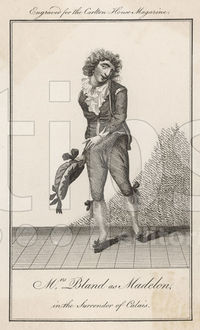Annotation:Lira Lira La: Difference between revisions
No edit summary |
No edit summary |
||
| (3 intermediate revisions by 2 users not shown) | |||
| Line 1: | Line 1: | ||
---------- | |||
---- | {{TuneAnnotation | ||
|f_tune_annotation_title= https://tunearch.org/wiki/Annotation:Lira_Lira_La > | |||
'''LIRA LIRA LA.''' English, Air (cut time). D Major. Standard tuning (fiddle). One part. The song appears in George Coleman's opera '''The Surrender of Calais''' | |f_annotation=[[File:madelon.jpg|200px|thumb|right|Mrs. Bland as Madelon]]'''LIRA LIRA LA.''' English, Air (cut time). D Major. Standard tuning (fiddle). One part. The song appears in George Coleman the younger's opera '''The Surrender of Calais''', music by Samuel Arnold, performed at the Little Theatre, Haymarket, London, on 30 July, 1791. "Lira Lira" is sung by the character Mandelon (famously performed by 'Mrs. Bland', Maria Theresa Bland, nee Romanzini, an Italian-Jewish actress/singer from age 4; in the travesti role), and begins: | ||
<blockquote> | <blockquote> | ||
''Little thinks the townsman's wife,''<br> | ''Little thinks the townsman's wife,''<br> | ||
| Line 13: | Line 13: | ||
''With her jolly soldier.''<br> | ''With her jolly soldier.''<br> | ||
</blockquote> | </blockquote> | ||
The melody also appears in several late 18th/early 19th century publications, such as James Aird's '''Selection''', vol. 4 (Glasgow, 1796), Thomas Preston's '''Entire New and Compleat Instructions for the Fife''' (London, 1796), G. Astor's '''The Hoboy Preceptor, or Military Pieces''' (London, 1800), and Thomas Ball's '''The Gentleman's Amusement Book 2''' (Norfolk, Va.). | The melody also appears in several late 18th/early 19th century publications, such as James Aird's '''Selection''', vol. 4 (Glasgow, 1796), Thomas Preston's '''Entire New and Compleat Instructions for the Fife''' (London, 1796), G. Astor's '''The Hoboy Preceptor, or Military Pieces''' (London, 1800), and Thomas Ball's '''The Gentleman's Amusement Book 2''' (Norfolk, Va.). | ||
|f_source_for_notated_version= | |||
|f_printed_sources= Aird ('''Selection of Scotch, English, Irish and Foreign Airs, vol. 4''') 1796; No. 186, p. 70. | |||
|f_recorded_sources= | |||
|f_see_also_listing= | |||
}} | |||
Latest revision as of 02:09, 16 May 2024
X:1 T:Lira Lira La M:C| L:1/8 R:Air Q:"Moderato" B:Aird – Selection of Scotch, English, Irish and Foreign Airs, vol. 4 (1796, No. 186, p. 70) Z:AK/Fiddler’s Companion K:D A2d2d3d|(cd)(ec) d4|(ef)(ge) (dc)(BA)|A2 d>e d2 z2| A2d2d3d|(cd)(ec) d4|(ef)(ge) (dc)(BA)|A2 d>e d2z2| f3f (fe) e2|(ed)(cd) A4|f2f2 (fe) e2|(ed)(cd) !fermata!A4| ABcA d4|cdec d4|(ef)(ge) (dc)(BA)|A2 (de) d2z2||

Little thinks the townsman's wife,
While at home she tarries;
What must be the lass's life,
Who a soldier marries.
Now with weary marching spent,
Dancing now before the tent,
Lira, lira, lira, lira, lira la,
With her jolly soldier.
The melody also appears in several late 18th/early 19th century publications, such as James Aird's Selection, vol. 4 (Glasgow, 1796), Thomas Preston's Entire New and Compleat Instructions for the Fife (London, 1796), G. Astor's The Hoboy Preceptor, or Military Pieces (London, 1800), and Thomas Ball's The Gentleman's Amusement Book 2 (Norfolk, Va.).

